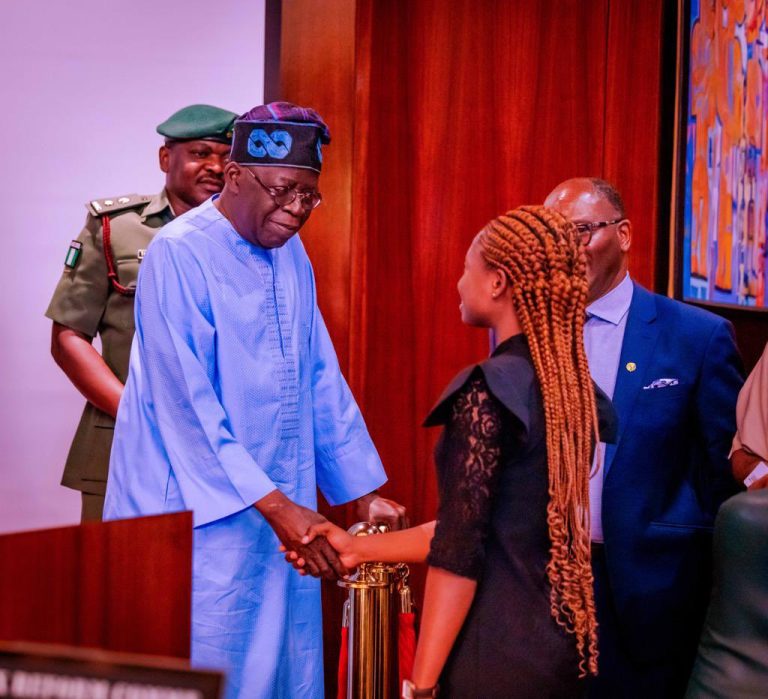By Michael Chibuzo
President Bola Ahmed Tinubu on Tuesday inaugurated the Presidential Committee on Tax Policy and Fiscal Reforms headed by a renown tax consultant, Taiwo Oyedele. Part of the mandate of the Committee as the name suggests is to suggest and carry out comprehensive reforms in Nigeria’s tax policy with a target to achieve 18% Tax to GDP ratio in three years. In doing so, the President was emphatic that poverty must not be taxed to allow the poor to breathe.
Let’s take a look at some statistics in order to understand the scale of our tax problem. In June, 2023, the National Bureau of Statistics announced an upward review of the country’s tax-to-gross domestic product (GDP) ratio for 2021 to 10.86 percent from 6 percent. Inspite of the upward review, the ratio is still one of the lowest in the world and significantly lower than even the African average of over 16%. In the ranking of countries based on tax-to-GDP ratio, Nigeria is near the bottom with war torn countries such as Libya, Somalia, Yemen and Syria as well as communist North Korea below us.
Nigeria’s very low tax to GDP ratio has forced us to resort to borrowing to finance regular budget deficits and stimulate growth. This has made total public debt (both domestic and external) to hit N49.85 trillion ($108.30 billion) as of March 31, 2023. This does not include FGN’s N22.719 trillion Ways and Means advances of the Central Bank of Nigeria whose securitisation was approved by the National Assembly in May 2023 and which will reflect in the public debt stock from June 2023.
As at March 31st 2023, Nigeria’s debt-to-GDP ratio is around 22%. Once the securitized ways and means of N22.719 trillion and the N8.80 trillion new borrowings projected for 2023 are added to the debt stock, Nigeria’s debt-to-GDP ratio will likely shoot up to between 35.2% to 38%. This is very close to our self imposed 40% national debt limit.
Crucially, the Debt Management Office (DMO) has said that Nigeria’s debt service-to-revenue ratio in 2023 stands at 73.5 percent. This is unsustainable and a threat to economy. What these statistics essentially mean is that if we are to survive and grow our economy without piling up more debts, we must increase revenues and there is no other way to do it other than through a comprehensive tax reforms and fiscal re-engineering, which is why President Bola Ahmed Tinubu set up the Taiwo Oyedele-led Committee.
Already the Presidential Committee has laid out potential policy options. Mr. Taiwo Oyedele hinted in an interview Wednesday on Channels TV that the Federal Inland Revenue Service (FIRS) should be the sole revenue collector for the federal government and is best-suited to collect revenue for the MDAs. He noted that Nigeria’s revenue collection from taxes is one of the lowest in the world but the cost of collection is high.
“Ironically, our cost of collection is one of the highest. And the reason for that is that we’ve got all manners of agencies. The Federal Government alone, we have 63 MDAs that were given revenue targets last year, no; actually in the 2023 budget,” he said.
“And two things that would come up from that: on one hand, these agencies are being distracted from doing their primary function which is to facilitate the economy. Number two, they were not set up to collect revenue, so, they won’t be able to collect revenue efficiently.
“So, move those revenue collection function to the FIRS. It has two advantages: the cost of collection and efficiency will improve, these guys will focus on their work, and the economy will benefit as a result. If you are Customs, focus on trade facilitation, border protection and if you are Nigerian Communications Commission (NCC), just regulate telecommunications. You are not set up to collect revenue.
“It can be your revenue and someone else can collect it for you. There will be more transparency because you see what is being collected and is accounted for properly. It is also a way of holding ourselves to account as to how we spend the money we collect from the people”, he added.
The Chairman also stated that Nigeria has a tax gap of around N20 trillion and that to increase the tax revenue, Nigeria will need to focus more on the few major taxes such as Value Added Tax, Corporate Income Tax, and Personal Income Tax. Taiwo Oyedele pointed out that a lot of people particularly in the middle class and the elite are not tax compliant with some of them in the tax net with ‘one or two fingers’, for example paying a thousand naira as tax when they should have paid N10 million.
With the anticipated tax reforms, all of the revenue not captured before would be brought into the tax net. The cheering news in all these is that certain businesses will have a breathing space. The Tinubu administration plans to repeal many of the taxes that currently make doing business difficult without introducing new ones and yet collect more according to the Presidential Committee Chairman. This plays into the general objective of the President not to tax poverty or strangulate small businesses with tax.
President Bola Ahmed Tinubu is therefore bringing his economic expertise horned over the years to bear. With valuable private sector and public service experience, President Bola Tinubu is perfectly placed to carry out a precise surgery on our tax administration in a way that will reduce tax burden on small businesses while increasing significantly our tax to GDP ratio and by extension Nigeria’s capacity to fund its expenditure without over reliance on borrowing. Welcome to Tinubunomics!

